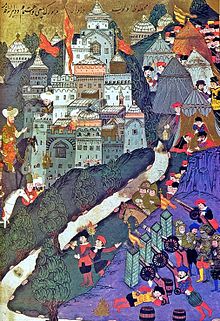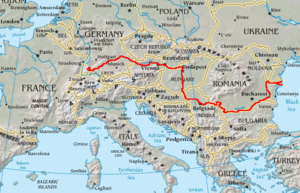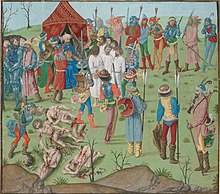Battle of Nicopolis
The Republic of Genoa, on the other hand, feared that if the Ottomans were to gain control over River Danube and the Turkish Straits, they would eventually obtain a monopoly over the trade routes between Europe and the Black Sea, where the Genoese had many important colonies like Caffa, Sinop, and Amasra.Burgundy's interest in sponsoring the crusade was in increasing his and his house's prestige and power and, historian Barbara Tuchman notes, "since he was the prince of self-magnification, the result was that opulent display became the dominant theme; plans, logistics, intelligence about the enemy came second, if at all.[20] According to the Chronica Hungarorum, King Sigismund of Hungary was so delighted at the sight of the large army gathered around him in Buda, he exclaimed in joy: "Who would be so bold as to dare to resist us?Historian Tuchman notes the Battle of Nicopolis was considered so significant that the number of combatants given by medieval chroniclers ranges as high as 400,000, with each side insisting that the enemy outnumbered them two-to-one, which for the crusaders offered some solace for their defeat and for the Turks increased the glory of their victory.[23] German historians of the 19th century attempting to estimate the combatants on each side came to the figures of about 7,500–15,000 Christians and about 12,000–20,000 Turks, while noting that, from the point of logistics, it would have been impossible for the countryside around Nicopolis to have supplied food and fodder for scores of thousands of men and horses.Venice supplied a naval fleet for supporting action, while Hungarian envoys encouraged German princes of the Rhineland, Bavaria, Saxony, and other parts of the empire to join.[29] The Ottoman force also included 1,500 Serbian heavy cavalry knights[30] under the command of Prince Stefan Lazarević, who was Sultan Bayezid's brother-in-law and vassal since the Battle of Kosovo in 1389.[1] While Philip, Duke of Burgundy, had originally planned to lead the crusade along with John of Gaunt and Louis of Orleans, all three withdrew, claiming that the peace negotiations with England required their presence, though perhaps also because none dared leave the vicinity of the throne if their chief rivals stayed.Burgundy, perhaps recognizing that his son, as well as Constable d'Eu and Marshal Boucicaut, who were both under 35, lacked the necessary experience, summoned Enguerrand VII, Lord of Coucy, the most experienced warrior and statesman of the realm, and prevailed on him to be "chief counselor" to Nevers during the crusade.[31] Rules of discipline for the crusade were decreed at a War Council on 28 March 1396, which included the final provision, "Item, that [in battle] the Count and his company claim the avante garde", revealing that the chivalric code continued to require knights to prove their valor by leading the charge.From there the crusader goals, though lacking details of planning, were to expel the Turks from the Balkans and then go to the aid of Constantinople, cross the Hellespont, and march through Turkey and Syria to liberate Palestine and the Holy Sepulchre, before returning in triumph to Europe by sea.Valentina Visconti, the wife of the Duke of Orleans and Gian Galeazzo's beloved daughter, had been exiled from Paris due to the machinations of Queen Isabeau the same month as the departure of the crusade.The Duke of Milan threatened to send knights to defend his daughter's honor but, in the wake of the disaster at Nicopolis, it was widely believed that he had relayed intelligence to Bayezid I of crusader troop movements.Coucy, his diplomatic mission complete and accompanied by Henry of Bar and their followers, left Milan for Venice, from where he requisitioned a ship on 17 May to take him across the Adriatic Sea, landing in the Croatian port of Senj on 30 May before making his way overland to the rendezvous in Buda.Sigismund had little choice but to acquiesce, though chroniclers also write that Coucy's speech excited jealousy in D'Eu, who felt that he should have had the honor of spokesman due to his position as Constable of France.[38][39] Leaving a garrison to hold Oryahovo, the crusaders continued towards Nicopolis, assaulting one or two forts or settlements along the way, but bypassing one citadel from which messengers escaped to inform Bayezid of the Christian army.Boucicaut claimed the noise of their celebration was a ruse as he believed that the Sultan would never attack; he further threatened to cut off the ears of anyone who discussed rumors of the Turks' approach as being damaging to the morale of the crusaders.Tuchman argues that it also increased the overconfidence of the French and again drew the jealousy of D'Eu, who accused Coucy of risking the army out of recklessness and attempting to steal glory and authority from Nevers.Sigismund proposed that, once the shock of first clash had passed, the French form the front line to rush in, while the Hungarians and the other allies follow to support the attack and keep the sipahis (Turkish heavy cavalry) from sweeping around the crusaders' flanks.Nevers summoned a hasty council of advisors, in which Coucy and Jean de Vienne, admiral of France and the eldest French knight on the crusade, advised obeying the wishes of the Hungarian king, which seemed wise to them.Struggling in their heavy armor, they reached the plateau on the top of the slope, where they had expected to find fleeing Turkish forces, but instead found themselves facing a fresh corps of sipahis, whom Bayezid had kept in reserve.As the sipahis surged forward in the counterattack sounding trumpets, banging kettle drums and shouting the Tekbir, the French realized how desperate their situation was and some knights fled back down the slope.Admiral de Vienne, to whom was granted the honor as the eldest knight of carrying the French standard into battle, was wounded many times as he attempted to rally his countrymen before being struck down.Accounts tell of the Hungarians and other nationalities in confused combat on the plain and of a stampede of riderless horses, which Tuchman speculates pulled free from their tethers, at the sight of which the Transylvanians and the Wallachians concluded that the day was lost and abandoned the field.The killing continued from early morning until late afternoon, at which point Bayezid, either himself sickened by the bloodshed or convinced by his ministers that he was unnecessarily enraging Christendom against him, called off the executioners.[52] Jacques de Helly, the knight who had identified the nobles after the battle, had been charged by Bayezid, under his vow to return, to inform the King of France and Duke of Burgundy of his victory and demands for ransom.Envoys were sent informing him of belated approval by the King allowing the fleur-de-lis to be added to the Visconti escutcheon, Galeazzo's first wife having been from the French royal house, and to make every effort to gain his assistance.Arriving in Venice in October after stopping in various islands to recover and borrow money, the financial transactions required to both provide the ransom and pay for the travel arrangements and living expenses of the nobles were tremendously complicated."[56] With a historian's hindsight Johan Huizinga remarked upon "the lamentable consequences of statecraft recklessly embarking on an enterprise of vital import in the spirit of a chivalrous adventure",[57] though participants and contemporary chroniclers did not analyse the event in these terms.Branković died as an Ottoman prisoner the following year, but is ironically portrayed in the Serbian folklore as a Judas-like figure.Вук Бранковић, син Бранков, оженио се Маром, кћерком кнеза Лазара.






Battle of Nicopolis (disambiguation)Ottoman wars in EuropeCrusadesJean ColombeNicopolisOttoman EmpireMoravian SerbiaCrusadeHoly Roman EmpireKingdom of FranceDuchy of BurgundyKingdom of HungaryVoivodship of TransylvaniaKingdom of CroatiaPrincipality of WallachiaKnights HospitallerRepublic of VeniceRepublic of GenoaBulgarian EmpireTeutonic KnightsByzantine EmpireCounty of CilliDistrict of BrankovićBayezid IÇandarlı Ali PashaEvrenosStefan LazarevićSigismund, King of Hungary and CroatiaStibor of StiboriczNicholas II GaraiPhilip, Count of EuJean II Le MaingreJohn, Count of NeversEnguerrand de CoucyJean de VienneJean de CarrougesMircea the ElderStephen II LackfiIvan SratsimirPhilibert de NaillacVuk BrankovićHungarian–Ottoman WarsHungarian–Ottoman WarWar of the South DanubeGolubacBelgradeMarosszentimre and Iron GateLong campaign and Crusade of VarnaZlatitsaKunovicaKosovoKruševacUžiceSmederevoZvornikVasluiSerbia ExpeditionBreadfieldOtrantoKrbava FieldŠabacMohácsOttoman–Habsburg warsKaranovasaRovineAnkaraTripoljeKosmidionCamorluScutariPolish–Ottoman Wars1375–13771389–13961415–14191437–14421443–14441485–15031502–15101593–16061615–16161620–16211633–16341666–16711672–1676Lipka rebellion1683–1699Crusading movementMilitary order (religious society)Crusade indulgencePapal income taxNorwegianVenetianSecondFourthBarons'SeventhCatalanEighthLord Edward'sFall of OutremerCrusades after Acre, 1291–1399SmyrnioteAlexandrianSavoyardHoly LeaguesNorthernKalmarWendishLivonianPrussianLithuanianVotianAgainst ChristiansDyrrhachiumConstantinopleAragonAlbigensianColonna familyDrentherHohenstaufenStedingerBosnianBohemianDespenser'sHussiteSpanish Armada
